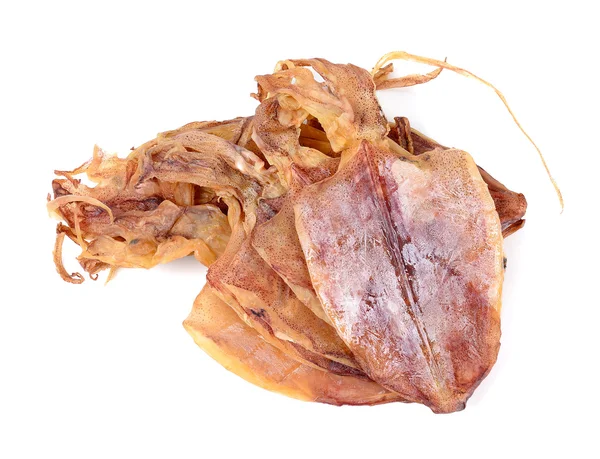
Can Dogs Eat Dried Squid? Yes, dogs can eat dried squid, but only in small amounts. Plain, unseasoned dried squid is safer than flavored versions, which may contain harmful additives or too much salt.
Before offering dried squid to your dog, always consider the potential risks. Every dog has different dietary needs, so it’s important to monitor them closely and ensure it’s a suitable treat for their health. So,let’s briefly discuss that- Can Dogs Eat Dried Squid?
Nutritional Facts of Dried Squid for Dogs
If you’re wondering, can dogs eat dried squid? it’s important to know its nutritional benefits and how it can affect your dog’s health. While dried squid can provide certain nutrients, it also comes with potential risks. Let’s break down its key nutritional facts:
1. High in Protein
- Why It’s Good: Dried squid is a great source of protein, which is essential for building and repairing muscles in dogs. It also provides the energy your dog needs to stay active and healthy.
- How It Helps: Protein is an important building block for healthy tissues and helps support overall muscle development in dogs.
2. Omega-3 Fatty Acids
- Why It’s Good: Dried squid contains omega-3 fatty acids, which are beneficial for your dog’s skin and coat. These healthy fats help keep your dog’s fur shiny and smooth while reducing inflammation in their body.
- How It Helps: Omega-3s are known to support heart health and improve joint mobility, especially in older dogs.
3. Low in Fat
- Why It’s Good: Dried squid is relatively low in fat compared to some other treats. It can be a good protein option for dogs that need to manage their weight or are on a low-fat diet.
- How It Helps: Lower fat content means less chance of your dog gaining excess weight, which is important for dogs that are already overweight or have special dietary needs.
4. Rich in Essential Minerals
- Why It’s Good: Dried squid contains several essential minerals such as iron, phosphorus, and magnesium. These minerals help maintain healthy bones, teeth, and overall bodily functions.
How It Helps:
- Iron is important for red blood cell production and oxygen transport in the body.
- Phosphorus supports bone health and energy metabolism.
- Magnesium helps regulate nerve and muscle function.
In answer to can dogs eat dried squid?, while it offers several nutritional benefits, it should only be given in moderation due to its high sodium content. Dried squid is rich in protein, omega-3 fatty acids, and essential minerals, which can support muscle development, skin health, and overall well-being in dogs. However, always be mindful of the portion size and potential risks like high sodium or choking hazards.
Potential Health Risks of Dried Squid for Dogs
Can dogs eat dried squid? While it may seem like an interesting treat for your dog, dried squid comes with potential health risks that you need to consider. Here’s a closer look at some of the main dangers associated with feeding dried squid to dogs:
1. High Sodium Content
- Why It’s a Concern: Dried squid often contains high levels of sodium. Too much sodium can be harmful to dogs, leading to dehydration, high blood pressure, or even sodium poisoning in severe cases.
- What Could Happen: If your dog consumes too much dried squid, they may experience excessive thirst, frequent urination, and even more serious health issues like kidney problems.
2. Choking Hazard
- Why It’s a Concern: Dried squid can be tough and chewy, which makes it a choking hazard, especially for small dogs or those that don’t chew their food well.
- What Could Happen: If the squid is not cut into small, manageable pieces, it can get stuck in your dog’s throat, causing choking or even injury to their digestive tract.
3. Additives and Preservatives
- Why It’s a Concern: Many commercially prepared dried squid snacks contain additives, preservatives, and seasonings to enhance flavor and shelf life. Some of these ingredients can be toxic to dogs.
- What Could Happen: Ingredients like garlic, onion, and artificial preservatives can lead to toxicity, causing symptoms such as vomiting, lethargy, or even damage to the dog’s red blood cells.
4. Digestive Upset
- Why It’s a Concern: Dried squid can be hard for some dogs to digest, especially if they have sensitive stomachs. The tough texture can lead to digestive issues.
- What Could Happen: Overconsumption of dried squid can cause vomiting, diarrhea, bloating, or general discomfort in your dog. This is especially true if they are not accustomed to seafood or new treats.
So, can dogs eat dried squid? While it’s not entirely off-limits, it’s important to consider the potential health risks. The high sodium content, choking hazard, additives, and digestive upset can pose serious concerns for your dog’s well-being. Always ensure moderation and preparation to minimize risks, and consult with your vet if you’re unsure.
How to Safely Feed Dried Squid to Dogs
Can dogs eat dried squid? Yes, dogs can eat dried squid, but it’s important to take precautions when offering it as a treat. If you decide to give your dog this snack, here’s how to do it safely:
1. Choose Plain, Unsalted Squid
- Why It’s Important: Flavored or spiced dried squid often contains added ingredients like garlic, onion, or excessive salt, which can be harmful to dogs.
- What to Do: Always select plain, unsalted dried squid to avoid any harmful additives. The simpler, the better for your dog’s health.
2. Cut Into Small Pieces
- Why It’s Important: Dried squid can be tough and chewy, which may pose a choking hazard, especially for small dogs.
- What to Do: Before offering dried squid to your dog, make sure to cut it into small, manageable pieces. This reduces the risk of choking and makes it easier for your dog to digest.
3. Offer in Moderation
- Why It’s Important: Dried squid should not be a regular part of your dog’s diet due to its high sodium content and potential for digestive upset.
- What to Do: Treat dried squid as an occasional snack rather than a daily treat. A small piece now and then will be enough to satisfy your dog’s taste buds without overdoing it.
4. Monitor Your Dog
- Why It’s Important: Even when following safety guidelines, dogs can still have adverse reactions to certain foods, especially if they have sensitivities or allergies.
- What to Do: Keep an eye on your dog after giving them dried squid. Watch for signs like vomiting, diarrhea, excessive thirst, or lethargy. If any of these symptoms appear, contact your vet.
So, can dogs eat dried squid? Yes, but it’s crucial to take steps to minimize risks. By choosing plain, unsalted squid, cutting it into small pieces, offering it in moderation, and monitoring your dog, you can safely treat your dog to this snack while keeping their health in check.
Signs of Sodium Overload or Allergic Reactions from Dried Squid
Can dogs eat dried squid? While dried squid can be an occasional treat for dogs, it’s important to be aware of potential signs of sodium overload or allergic reactions that can occur if they consume too much.
1. Excessive Thirst and Frequent Urination
- What It Means: High sodium content in dried squid can cause dehydration, leading your dog to drink more water and urinate frequently.
- What to Look For: If your dog seems excessively thirsty or is urinating more than usual after eating dried squid, this could be a sign of sodium overload.
2. Vomiting or Diarrhea
- What It Means: Dried squid can upset your dog’s digestive system, especially if eaten in large amounts. This can lead to vomiting or diarrhea.
- What to Look For: If your dog vomits or has loose stools shortly after eating dried squid, it might be reacting to the food.
3. Lethargy or Weakness
- What It Means: Sodium toxicity can affect your dog’s energy levels, making them feel weak or lethargic.
- What to Look For: If your dog seems unusually tired or weak after eating dried squid, it could indicate a problem with sodium overload.
4. Itching, Swelling, or Skin Irritation
- What It Means: Some dogs may be allergic to seafood or other ingredients in dried squid, which can cause allergic reactions.
- What to Look For: If you notice your dog scratching, licking, or showing signs of swelling or irritation on their skin, it may be an allergic reaction to the squid.
If your dog shows any of these signs after eating dried squid, it’s important to contact your vet. Can dogs eat dried squid? Yes, but it’s crucial to be mindful of these symptoms and monitor your dog closely for any negative reactions.
Healthier Alternatives to Dried Squid for Dogs
While can dogs eat dried squid? It’s important to recognize that there are healthier and safer alternatives that can offer similar benefits without the risks associated with dried squid. Here are some great options to consider when treating your dog:
1. Plain Cooked Fish
- Best Options: Salmon, cod, or whitefish.
- Why It’s Good: These fish are rich in protein and omega-3 fatty acids, which promote healthy skin and a shiny coat. Make sure the fish is cooked thoroughly and without any added seasoning, as spices can be harmful to dogs.
- How to Serve: Serve the fish plain, with no salt, oils, or seasonings, and cut it into bite-sized pieces for easy chewing.
2. Freeze-Dried Fish Treats
- Best Option: Freeze-dried fish treats specifically designed for dogs.
- Why It’s Good: These treats maintain the nutritional benefits of fish, including high protein and omega-3 fatty acids, while being a safer, dog-friendly option. They are typically low in sodium and free from harmful preservatives.
- How to Serve: Simply give your dog one or two freeze-dried treats as an occasional snack.
3. Boiled Chicken or Turkey
- Best Option: Lean, boiled chicken or turkey.
- Why It’s Good: Both chicken and turkey are great sources of lean protein that help in muscle growth and repair. These meats are easy on the digestive system, making them a safe and nutritious snack for your dog.
- How to Serve: Boil the meat without any seasoning and chop it into small pieces for a simple, safe treat.
4. Vegetable Snacks
- Best Options: Carrots, cucumbers, or sweet potatoes.
- Why It’s Good: Vegetables are a low-calorie, nutrient-packed alternative to dried squid. They provide important vitamins and minerals and are easy to digest. Plus, they can satisfy your dog’s crunch cravings without being unhealthy.
- How to Serve: Slice the vegetables into small, manageable pieces or serve them whole (like a carrot stick) for a healthy snack.
When asking can dogs eat dried squid, it’s important to remember that there are many healthy and safe alternatives that can provide similar nutritional benefits without the potential risks. Plain cooked fish, freeze-dried treats, lean poultry, and fresh vegetables are all excellent options to treat your dog in a safer, healthier way. Always ensure that any treats you offer are free from harmful additives and seasonings.




